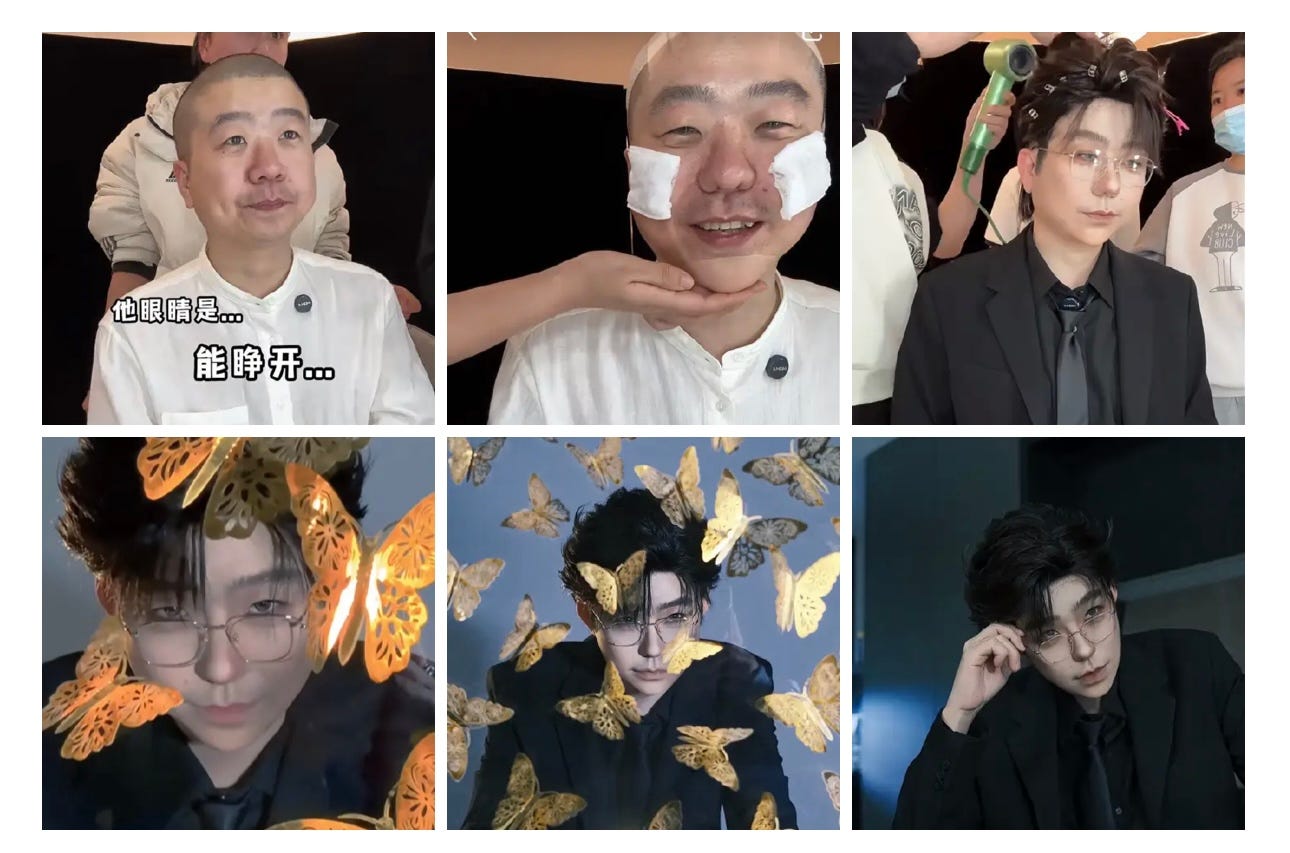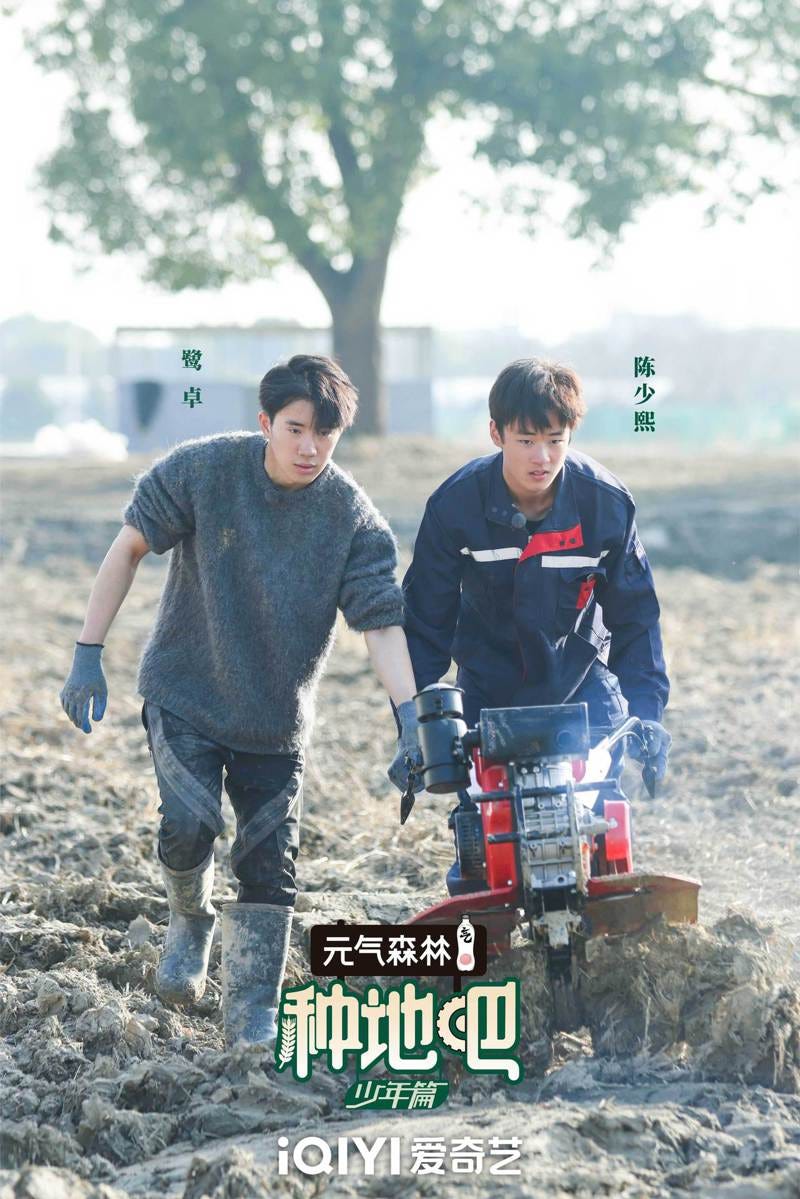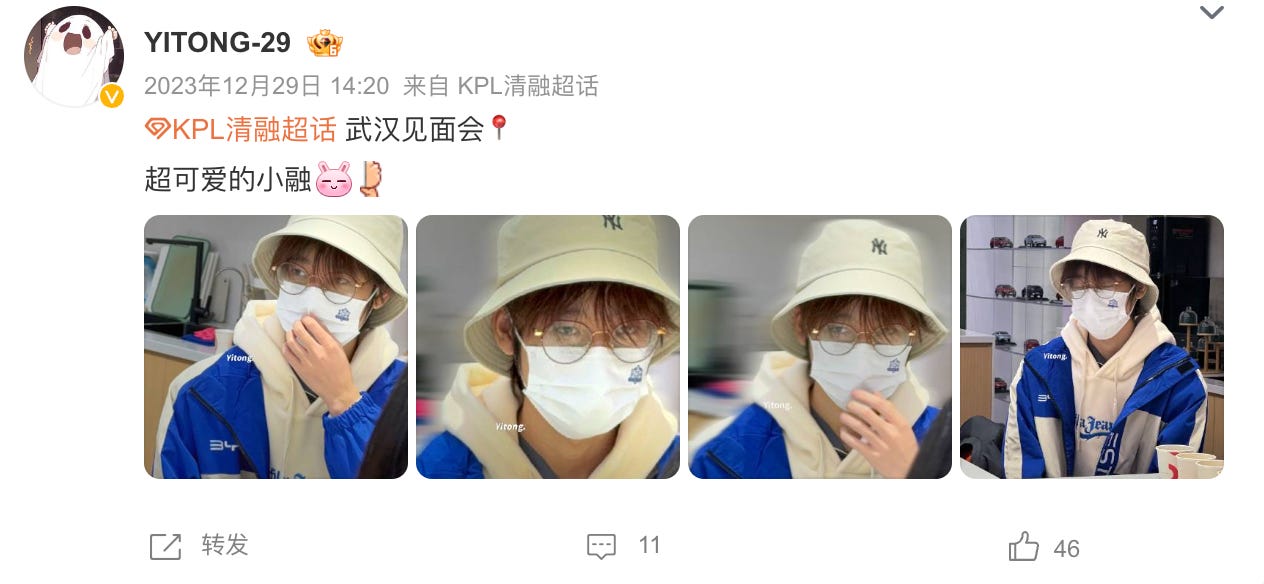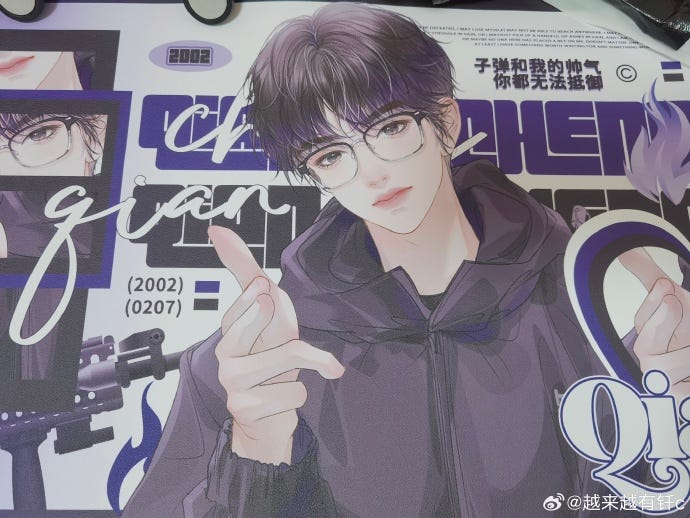07. All Fun and Games Until...
The Gamer-Celebrity Pipeline
Hi there. Welcome to Active Faults.
The headliners of my recent fan-talk issue, Pu Yixing and Guo Wentao, built a huge chunk of their celebrity profiles with a side hustle in a booming industry: game streaming. Being reality stars who also knew how to play video games, they introduced their fan bases to the e-sports industry and vice versa, namely converting e-sports fans into their own who started to watch their media content.
Today, we’re looking at that two-way street, the gamer—celebrity pipeline. Why are celebrities becoming entertaining gamers, and e-sports athletes becoming entertainers who game?
This is trending on Weibo right now as I write: “电竞男主爆改种田男主”, “E-sports Male Lead Crazy Transformation into a Farming Male Lead”. Let’s translate that even further.
爆改 or Crazy Transformation, literally “Explosive Change”, is the newest slang on the block. It refers to a canon of short videos you’d see on Douyin these days where an individual’s face is utterly and shockingly transformed to look like someone else, normally using filters, special effects and cosmetics. More often than not, it’d feature an individual who’s generally regarded as unappealing being glowed up to look like a celebrity. E-sports male leads and farming male leads, on the other hand, are online novel caricatures. A swift browse of Jinjiang would show you the popularity of these professions amongst authors for their dashing protagonists.

What this hashtag actually promotes is how KPL athletes are about to film an episode of 种地吧, the agricultural reality show I commented on earlier this year. They are e-sports players competing in the most prestigious gaming league of China’s most lucrative game, 王者荣耀 (Honor of Kings, a mobile version of League of Legends), sent to a farm in a village in Zhejiang province for reality TV exposure. Alongside the original cast of 10 young male celebrities, they are expected to collaboratively maintain wheat fields, plant strawberries, log bamboo shoots and more.
Fans comment under the teaser clips of this episode saying “My worlds are colliding”, “looking forward to seeing my baby Qiancheng [an athlete]” and “I never thought me and my e-sports fan friend can bond over the same thing”. Another fan writes “Please open a stream on Douyu where you all play Honor together, I would gift you a few aeroplanes [the most expensive kind of virtual gifts on the platform]”.
Register from these fan responses how gaming, streaming and celebrity fandom are intricately enmeshed together. Firstly, gamers nowadays are being cultivated into celebrities who appear on entertainment content. They have a secure fan base and that community embraced fanquan-ish dynamics, as well as practices like comments controlling and “安利”, promotion of a celebrity aimed at non-fans. On the other hand, celebrities are encouraged to game because it makes them more down to earth, within reach, like any one of us. Both groups are prompted to live stream on select platforms where a more “intimate” real-time connection can be established, and direct financial investment can be made as a token of appreciation.
It is this last part that really matters: the money. Celebritising gamers before pushing them into the media and entertainment structure are capitalising on the general public. The same applies to any creation of influencer, or 网红, that hasn’t come from an organic viral moment. I know that gamers now have their own fan signs, merch, super topics, Spring Festival Gala-like event and performances, popular danmei ships and so on. They’ve even got their own xuanxiu. In South Korea where e-sports is an even bigger market, I see athletes doing TikTok challenges with idols or go on reality shows. All of this bring in tangible revenue and traffic.
The “饭圈化” of non-entertainment spaces i.e. sports, musicals, plays, operas and even historical figures in recent years became a controversial occurrence. People are disgruntled with how “crazy fan girls” can be disruptive to a previously untarnished ecosystem of consumption and appreciation. More specifically, it is the “stan culture” behaviours that irked everybody: excessive spending that drives up prices of seats and lowers the availability of tickets, continuous instigation of conflicts and competition, and demeanours which prevents others from enjoying the spectacle.
In the musical theatre context, this might take the form of fans screaming and cheering for the actors mid-performance, like people would at a concert of an idol. It might also be the emergence of 站姐 for the public figures in those spaces. They are grassroots fan photographers running dedicated social media accounts, usually in a fanquan context. While most treat it as a labour of love, a lot of 站姐 monetise their work by selling their photos to other fans in a Photo Book (PB) or other related merch items. A 站姐 for a musical actor might sneak in a DSLR and photograph the performance against the copyright rules for a later upload (and monetisation) on Weibo.
Metaphorically speaking, it is a question of the Indigenous Fans versus the Intruders and the Colonisers. Fans in non-entertainment spaces consider themselves natives of their lands. By a stroke of chance, their land becomes desirable to others and in come those whom they consider looters and heathens radically and disrespectfully changing the landscapes and customs. Their rejection of fanquan is a legitimate defense in many ways and some etiquettes definitely should be boycotted. But in the e-sports (and traditional sports) community, this dispute is particularly gendered.
I loved this piece by Tamar Herman that addresses this exact tension, where arts are automatically deemed inferior to sports and so are their fan bases because:
It ultimately comes down to one thing: sports are a male-oriented arena [Editor’s Note: so is e-sports], whereas the arts, and music, is seen as a female-oriented one…Athletes are modern gladiators, I've been told, fighting for glory [Editor’s Note: and their beloved motherland if they’re from a particularly nationalist country]. Musicians can't compete with that sort of toxic glorification, or the billions pumped into fuelling that fan-based infrastructure.
Hence the act of celebritising gamers and fanquan-ising the e-sports community has been under fire for years. It is a gender battle at its core. Gamer men repel the rush of women into their quarters and treat them with hostility. So much sexism is found in the e-sports fan circles.
When Qiancheng the KPL athlete is seen farming, his fans lovingly reminded him to wear sunscreen and not get tanned lest he loses his milky white skin. I’m not saying that all female e-sports fans are there for the looks of attractive players, but it applies to a portion of them. I suspect that’s what the male indigenous fans feel threatened by. In the virtual gaming world where sexual capital that they lack is finally, finally rendered worthless, some female fans reinstated its value. It explains male fans’ hyper-obsession with the competence (实力) of an e-sports athlete, shouting maxims like “Incompetence is the Original Sin” (菜即原罪) for a gamer which is not untrue. But underneath that, I’d argue there’s a real incel anxiety.
So when an e-sports athlete and KPL world champion like Nuo Yan participated in Produce Camp 2021 the idol survival reality show, he was slighted by both camps. The gamer fans (mostly male) from his club, eStarsPro bashed him for being “unprofessional”, “unmanly” and an effeminate attention-seeker. Fanquan and xiufen (mostly female) bashed him for being a half-hearted, unattractive, severely undertrained idol, a total joke of a contestant. To this day I still don’t understand his intention -- he got the worst of both worlds by straddling the two.
Nuo Yan’s Produce Camp competitor, Zhou Keyu did manage to successfully debut in the boy group INTO1. He later got cast by Tencent (who also not so coincidentally owns Honor of Kings) on their highly ambitious celebrity gaming show, We Are The Champions (战至巅峰) in 2022 and 2023. The premise is to gather celebrities of different Honor proficiencies to team up with professional Honor athletes and compete in a tournament. They were invited to stay in the athlete’s training camp and experience their daily lives.
Again from the public reception of Champions you’ll see that enmeshment I talked of. Gamers attract fans who behave like they would in fanquan, praising their looks or athleticism, writing fan fictions or making Bilibili as well as Douyin edits of them. Celebrities and especially idols like Zhou Keyu, because they showed their competence in e-sports, are doused in a new halo of boyish charms. They’re playful, cooler with “athleticism”, more perfect like web fiction characters and more relatable as your everyday teammate on Honor. As a show, all cast have done gaming live streams together to chat with their fans and maintain that parasocial relationship. Who’s the winner in this two-way street of a conversion loop? Tech giants like Tencent, who owns both Honor of Kings and most of China’s entertainment industry reap the benefit. Players who have stakes in both of those arenas. We are, quite literally, not the champions in this case.





